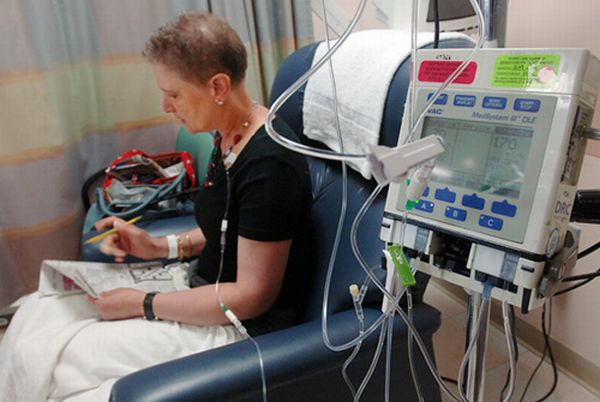
Chemotherapy is usually a treatment for cancer. It basically means treatment of disease through chemical substances or drugs. It is most commonly used to refer an antineoplastic (anticancer) drug or a combination of such drugs into a standardized treatment regimen. Chemotherapy brings along many side effects which cause discomfort to the patient undergoing it. This article gives some tips to cope with chemotherapy.
The following is a list of 15 tips to cope with the side effects of chemotherapy:
1. Unpleasant taste
Water and meat are the two most common items that become distasteful during chemotherapy. The patient can overcome this by drinking flavored mineral water or lemon juice. Other sources of protein such as eggs, fish, beans, or pulses can be tried to cope with distaste to meat.
2. Constipation
Increase the amount of fiber in the diet and drink plenty of water. An exercise regime such as a 20-minute walk would also be helpful to fight constipation.
3. Diarrhea
Take drinks that contain caffeine such as coffee, strong tea, and cola beverages in a very limited quantities. Do not take milk or milk products and also fatty or oily food. You can take fruits without the skin. Frequent small meals would be helpful too.
4. Nausea
Patients can reduce nausea by eating lukewarm foods and not very hot foods. They can also take ginger products to fight nausea like gingered tea, chewing raw ginger etc. Avoid oily and greasy foods and foods that have strong odors. Taking frequent small meals would be helpful.
5. Loss of appetite
Taking easy to digest food would be helpful. Since carbohydrates are digested easily, include them in your eating routine.
6. Sore mouth
Avoid hot spicy food and warm food. Drink plenty of water and keep the mouth clean by rinsing the mouth with normal saline.
7. Immunosuppression
Patients undergoing chemotherapy must take steps of not letting any infection enter their body as their immune system becomes weak. They must ensure to wash their hands regularly, specially before eating. They must be away from sick people who have contagious diseases.
8. Fatigue
Try to balance between activity and rest. Fatigue will go after the patient recovers from chemotherapy.
9. Hair loss
Use a mild shampoo. Comb your hair with a soft brush. Do not use excessive hot blow dryer to dry your hair. Maintain short hair to tackle hair loss problem. Cover your head with a hat or scarf while going out. Do not go for cosmetic hair treatments like dying, perming, or coloring during this period. Important to note, hair loss in chemotherapy is a temporary effect. Hair starts to regrow a few weeks after the treatment is finished.
10. Liver damage
Most chemotherapeutic drugs are hepatotoxic (cause damage to the liver). Taking alcohol in this condition would make things worse. So it is advised to avoid alcohol altogether.
11. Neuropathy
Neuropathy means nerve dysfunction. Its symptoms are pain, numbness, and tingling (burning feeling). Avoid tight-fitting shoes and socks, instead use loose cotton socks and padded shoes. Massage would be helpful.
12. Menopause
In woman, chemotherapy may temporarily or permanently stop periods. Avoid hot flushes by taking soy products or vitamin E. Local dose of estrogen in vagina would prevent vaginal dryness.
13. Emotional effects
Anxiety and depression may result in patient undergoing chemotherapy. Relaxation techniques taking deep breath, listening favorite music, and going to favorite place would help. Light exercise such as walking, biking, doing yoga, etc. is another way of coping stress. Some people may need joining a cancer support group for rehabilitation.
14. Infertility
Some types of chemotherapeutic drugs are gonadotoxic (harmful to testes and ovaries) and may cause infertility. Patients may choose methods of fertility preservation prior to chemotherapy such as cryopreservation of semen and ovarian tissue.
15. Blood clotting problems
One of the side effects of chemotherapy is that it weakens the bone marrow. Bone marrow helps in blood clot by producing platelets which stop the bleeding by clotting the blood. Do not take any medicines without the doctor’s prescription. Some medicines can affect platelets if they have aspirin. Consult your doctor before drinking any alcoholic beverages. Brush your teeth with a soft toothbrush to avoid bleeding of gums. Use a soft tissue while blowing your nose. Use sharp objects like scissors, needles, and knives carefully. Take extra care not to burn yourself while cooking or ironing. Avoid contact sports and other activities that might result in injury. Ask your doctor if you should avoid sexual activity. Use an electric shaver instead of a razor.




